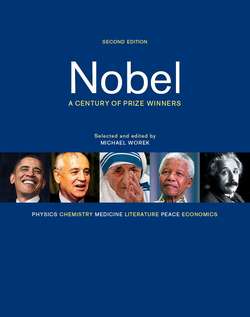Читать книгу Nobel - Michael Worek - Страница 42
На сайте Литреса книга снята с продажи.
ОглавлениеHenri Marie La Fontaine (1854–1943)
1913 Peace
For his efforts to establish and follow the principles of international understanding and cooperation among men.
Henri Marie La Fontaine was a lawyer, teacher, parliamentarian, diplomat, writer and bibliographer. He was, however, above all a pacifist and an internationalist. La Fontaine received his doctorate in law from the Free University of Brussels and was, for many years, one of Belgium’s leading lawyers, writing a technical work on the rights and duties of contractors of public works in 1885 and collaborating on another concerning counterfeiting in 1888.
His involvement in liberal reform pushed him into politics. A socialist, he wrote papers for the Socialist Party, spoke at meetings and helped establish the newspaper La Justice. He was elected to the Belgian Senate and represented Hainaut between 1895 and 1898, Liège between 1900 and 1932 and Brabant between 1935 and 1936. He was secretary of the Senate for 13 years (1907–1919) and a vice-president for 14 years (1919–1932).
As a senator he devoted most of his time to issues concerning education, labor and foreign affairs. He took part in the reform of primary education and defended the funding of public schools. He also investigated the working conditions of miners and supported the reduction of the working week to 40 hours. In 1901 he asked the Belgian government if it would arbitrate in the Boer War and proposed various legislative measures that contributed to international cooperation and peace.
No sooner had he entered the Senate than La Fontaine, founder of the Belgian Society for Arbitration and Peace, joined the Interparliamentarian Union, the first permanent forum for multilateral political negotiations, which was established in 1889. The union, which included eight members who were or would go on to receive the Nobel Peace Prize, was seen by La Fontaine as the beginning of an international parliament and, eventually, a world government. La Fontaine also participated in the founding of the International Peace Bureau and became its president in 1907. This organization received the Nobel Peace Prize in 1910.
La Fontaine kept writing during this period and produced important works for the cause of peace. Particularly interested in creating bibliographies and methods of referencing, La Fontaine founded the International Bibliography Institute in 1895.
After receiving the Nobel Peace Prize in 1913, La Fontaine continued working as a writer and bibliographer but also as a politician and diplomat. He was a member of the Belgian delegation present at the Paris Peace Conference and a delegate at the first assembly of the League of Nations (1920–1921). He died in 1943.
